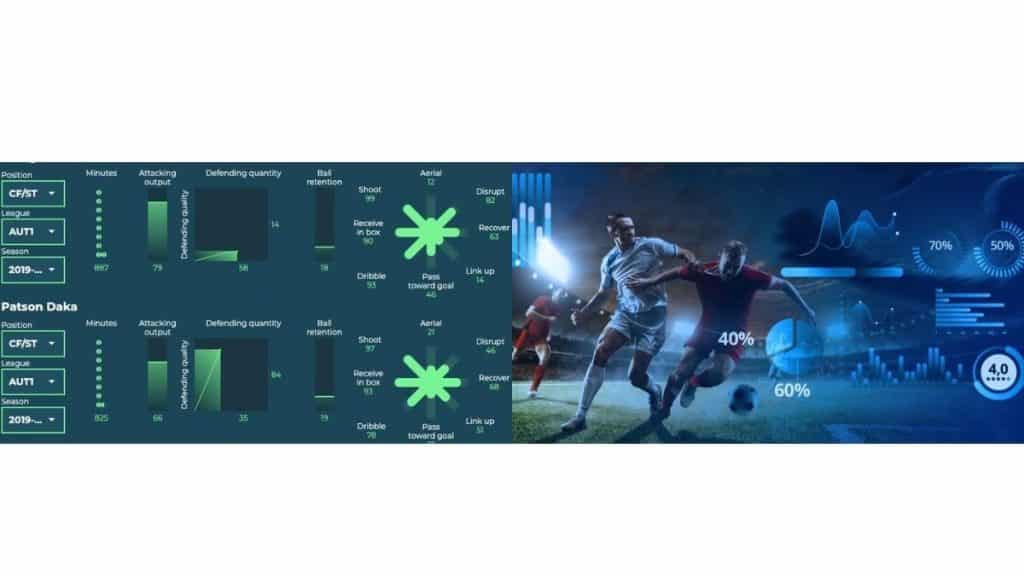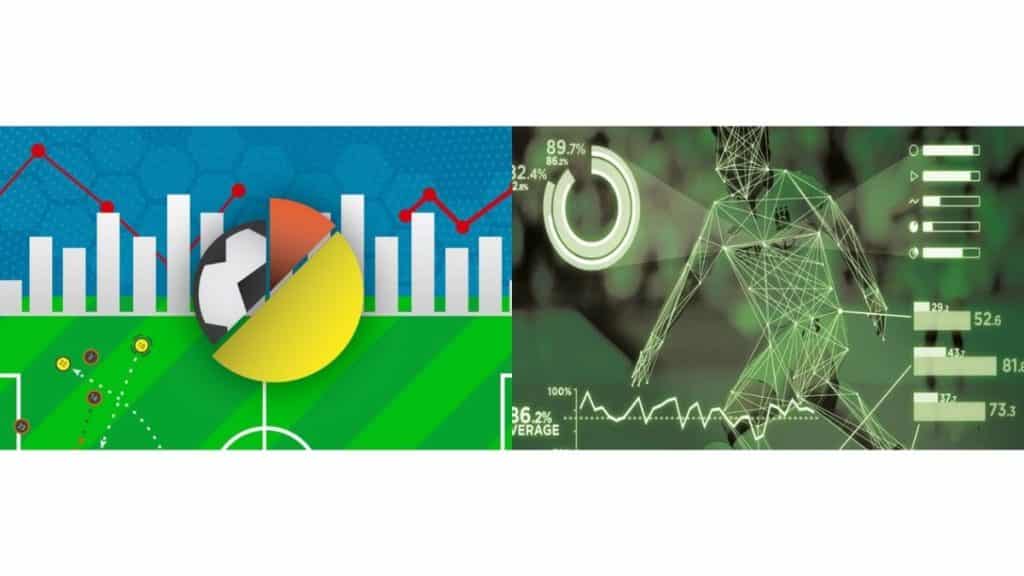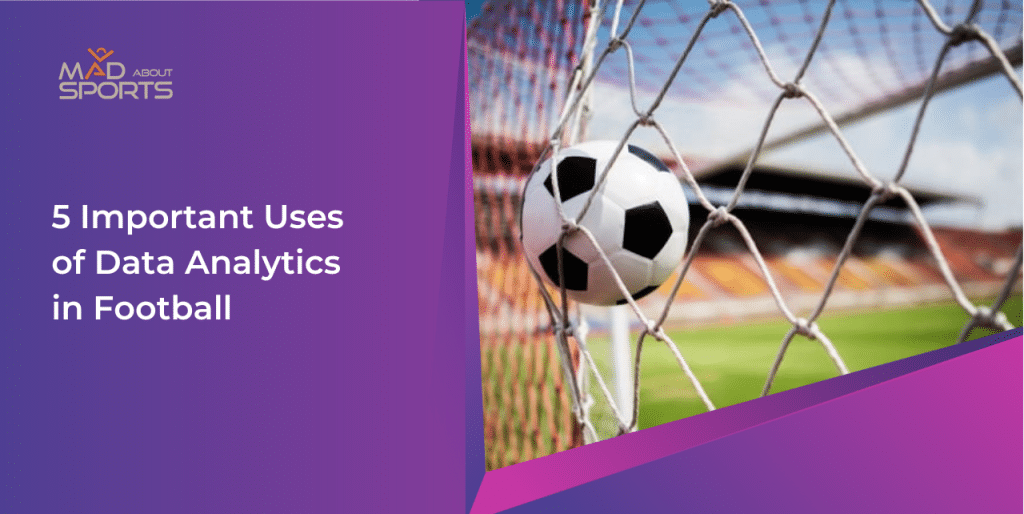Data Analytics has become a major part of almost every sport in today’s day and age and football is no exception to that fact. Data analytics in football [football analytics] has been a major contributor to roster building and developing strategies against opponents. It also helps players understand their weaknesses and strengths and build plan of execution based on the findings. Football analytics helps players understand opponents as well as themselves.
Football analytics by definition is the breakdown of football-related data from matches and players, and analysis of that data to create a strategy to counter or improve the particular player/team on whom/which the data has been collected. Data analytics in football has made life much easier for coaches and managers to make decisions on roster building as well as coaching strategies that need to be applied against a particular opponent.

Data analytics in football has become the norm in the sport of football today but there are still questions that arise about football analytics in general. Sometimes even professionals in the football industry will have doubts regarding the use of data analytics in football as it is a developing field within the sports industry. A lot of people prefer to use the eye test over analytics. While analytics cannot evaluate player qualities like determination and hard work, it does give the most accurate data breakdown of an athlete with the resources available at disposal today.
In this blog, we will be answering how impactful data analytics in football is by listing out five important uses of it.
How Data Analytics Is Used In Football
One of the most asked questions when it comes to data analytics in football is the question of how football analytics is used. So far, we understand the role that data analytics plays in football but it still does not explain how football analytics is actually used. To understand how exactly football analytics is used, we have to understand what exactly a data analyst does with the data obtained from matches.
The first part of football analytics is the collection of data. Data analysts collect data on players from matches that they play. This data is collected by devices like pitchside cameras and GPS tracker vests. Once this data is collected, it is broken down into a less complicated version in order to allow executives and coaches that are not well versed in analytics to understand what the collected data means. This in turn helps executives and coaches evaluate talent and have the information required to scout talents.

This is where a data analyst’s job ends and it is up to the executives and coaches to decide on how they would act on the data that they have received. A major reason for analytics not being the holy text when it comes down to sports decisions is because analytics has its limitations as well. A major limitation is not being able to judge a player’s character or how hard he works, as those are unquantifiable parameters.
Hence while the data might show that statistically, a player might have a mediocre game or even a mediocre tournament, he might be a great leader in the locker room. This is why the front office and coaching staff cannot make final decisions to substitute a player or even cut or trade them based on what the analytics suggests. They have to take into consideration other factors and make a final decision based on a holistic view of the situation.
5 Important Uses Of Football Analytics
Football analytics has a lot of benefits as it can deliver great results to the teams. The top five places where football analytics is used are:
1. Performance Analysis:
The best use of football analytics is that we can do performance analysis through it. When we study data and numbers for a footballer, we can find out his strengths or weaknesses and work on them accordingly. Teams can use video footage and analyse the key points of their game and how can they improve it. Match statistics help teams make informed decisions about their players and make winning strategies.
2. Scouting:
Another very important aspect of football analytics which will never go out of fashion is scouting, Scouting is an age-old phenomena but one which is highly effective. So often we hear unknown young players being signed by big clubs, who then go on to become mega stars. Clubs like Liverpool, Dortmund, Ajax, FC MIdtylland, etc are popular for using data analytics to sign new players.
Through scouting, teams keep an eye on players from various leagues all over the world, analyse which player would suit their style, and then sign them. Scouting saves a lot of money as clubs get these young players for very less money rather than paying over the odds for household names.
3. Opposition Analysis:
A great aspect of football analytics is that not only can one analyse their own team, but it can be used to analyse the opponents as well. Since the professional matches are streamed worldwide, and their data is readily available, teams can analyse any upcoming opponent’s game and prepare accordingly.
This is an extension of a coaching arm, and with the help of opposition analysis, teams can be much more ready for a game and have favorable strategies and tactics that can work in their favour during the game.
4. Coaching and Player Development:
By the use of data analytics, teams can improve their coaching methods and playing style. The use of football analytics is also very important in player development. How? Because having objective and measurable feedback can help both coaches and players speed up the learning process and create an effective training process.
Data analytics can help a player unlock his/her true potential and reach greater heights.
5. Fantasy Football:
Lastly, data analytics has a big role in fantasy football. We all know what popular fantasy sports is, and how big the market for it is. Data analytics can help you analyse the games, and pick the best fantasy football teams that will yield great results for you. You can use statistics, past even data, and create your optimal playing XI which will have a high chance of winning,
Why Has Data Analytics Become Such An Integral Part Of Football?
Over the past few years, data analytics has become a huge part of football. A major reason behind this is because of the simplification of data that analytics brings to the sport of football. Football analytics not only helps collect an enormous amount of data that cannot be collected manually but once that data is processed by a data analyst, it provides a great deal of information to teams regarding their opposition as well as themselves.
Another major reason is that there have been occasions where football analytics was ignored and the team had to pay the price. When sports analytics made its way into the sports industry in the beginning, it was followed by cynicism from a lot of managers, coaches, players and even former players because they did not believe that a computer could give them information about the game.

The best example would be that of Southampton manager Harry Redknapp in 2005. Redknapp who had an old-school mentality of trusting people and their experience over analytics, is quoted to have told the data analysts of Southampton at the time,” I’ll tell you what, next week, why don’t we get your computer to play against their computer and see who wins?”
Redknapp never utilized analytics to gameplan throughout that season and Southampton failed to get a promotion. By 2021, 19 out of 20 Premier League teams were using a player tracking software called Prozone to collect data from players. With the experiences that football organisations have had in the past, they have found a balance between the technological data they can derive from football analytics as well as the input from experienced individuals that have been a part of the football industry for a long time.
For becoming a video analyst you would need to have a degree in media and communications. The most common route to becoming a football analyst that works on the statistical side is to pursue a bachelor’s degree in data analytics, statistics, mathematics or programming and then make your way into the sports industry. Some students take majors like statistics along with a minor in programming.
With the growth of data analytics in football along with the growth of the sports industry as a whole, becoming a football analyst is a very lucrative career opportunity today. If you plan on pursuing a career in the sports industry and your field of interest is analytics, then this is the career for you. For a sports fan to be able to have a job in the sports industry is the next best option to actually playing sports professionally.
Conclusion
We now know the 5 most important uses of football analytics. We are also aware of understanding how data analytics in football works, why it is such an integral part of the football industry and how having a career as a football analyst can be extremely helpful if you are planning on pursuing a career in the field of sports.
If you have doubts related to a career as a football analyst then we at Mad About Sports have the best resources to help you on your journey. While this article provides information about football analytics the people that can provide better perspective are expert football analysts. At Mad About Sports, we have our very own expert football analyst, Mr. Sushant Rao who can give you the best advice. To know more click on the link below.
Author : Aniruddh S Kumar




Nice Article